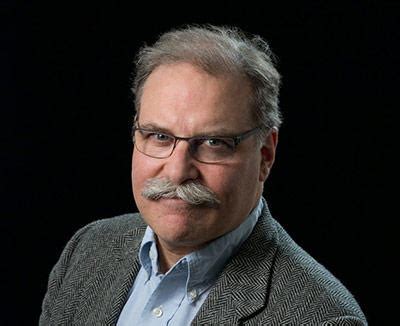A Quote by Ted Sizer
The first object of any act of learning, over and beyond the pleasure it may give, is that it should serve us in the future. Learning should not only take us somewhere; it should allow us later to go further more easily.
Related Quotes
To recognize our bias toward error should teach us modesty and reflection, and to forgive it should help us avoid the inhumanity of thinking we ourselves are not as fallible as those who, in any instance, seem most at fault. Science can give us knowledge, but it cannot give us wisdom. Nor can religion, until it puts aside nonsense and distraction and becomes itself again.
This is the first lesson ye should learn: There is so much good in the worst of us, and so much bad in the best of us, it doesn't behoove any of us to speak evil of the rest of us. This is a universal law, and until one begins to make application of same, one may not go very far in spiritual or soul development.
If a man is rich and strong anywhere, it must be on his native soil. Here I have been these forty years learning the language of these fields that I may the better express myself. If I should travel to the prairies, I should much less understand them, and my past life would serve me but ill to describe them. Many a weed here stands for more of life to me than the big trees of California would if I should go there. We need only travel enough to give our intellects an airing.
This is exactly how falling in love should be in my opinion. It should be scary yet unflinching. We should fear it but know that it's worth the risk and we should throw ourselves full throttle into the darkness with nothing but hope to guide us. And, like learning to ride a bike, once we learn to love we never forget how and it seems we only become
Ideally, nothing should be embraced by a consumer firmly, nothing should command a commitment till death do us part, no needs should be seen as fully satisfied, no desires considered ultimate. There ought to be a proviso 'until further notice' attached to any oath of loyalty and any commitment. It is but the volatility, the in-built temporality of all engagements that truly counts; it counts more than the commitment itself, which is anyway not allowed to outlast the time necessary for consuming the object of desire (or, rather, the time sufficient for the desirability of that object to wane).
We should not knowingly allow any species or race to go extinct. And let us go beyond mere salvage to begin the restoration of natural environments, in order to enlarge wild populations and stanch the hemorrhaging of biological wealth. There can be no purpose more enspiriting than to begin the age of restoration, reweaving the wondrous diversity of life that still surrounds us.
Learning should be engaging. Testing should not be the be all and end all. All students should have a broad curriculum that includes the arts and enrichment. Students should have opportunities to work in teams and engage in project-based learning. And student and family well-being should be front and center.
God is ready to give more quickly, and to give more than you ask; yea, he offers his treasures if we only take them. It is truly a great shame and a severe chastisement for us Christians that God should still upbraid us for our slothfulness in prayer, and that we fail to let such a rich and excellent promise incite us to pray.
The Ideal Man should talk to us as if we were goddesses, and treat us as if we were children. He should refuse all our serious requests, and gratify every one of our whims. He should encourage us to have caprices, and forbid us to have missions. He should always say much more than he means, and always mean much more than he says.
There is, however, no advantage in reflections on the past further than may be of service to the present. For the future we must provide by maintaining what the present gives us and redoubling our efforts; it is hereditary to us to win virtue as the fruit of labour, and you must not change the habit, even though you should have a slight advantage in wealth and resources; for it is not right that what was won in want should be lost in plenty.
It is madness to wear ladies' straw hats and velvet hats to church; we should all be wearing crash helmets. Ushers should issue life preservers and signal flares; they should lash us to our pews. For the sleeping God may wake someday and take offense, or the waking God may draw us out to where we can never return.
. . . The books we need are the kind that act upon us like a misfortune, that make us suffer like the death of someone we love more than ourselves, that make us feel as though we were on the verge of suicide, or lost in a forest remote from all human habitation-a book should serve as an axe for the frozen sea within us.
































